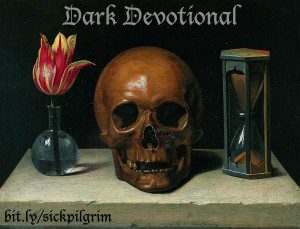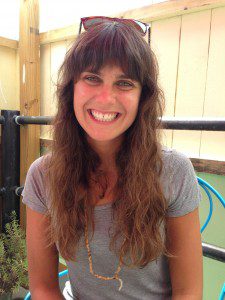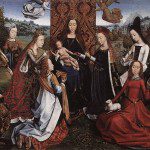
—————————————————————————————————————————–

For many years, my father was the only saint I’d pray to. St. Paul of West Creek, NJ, pray for me. I then proceeded to call or message him what need was most pressing.
My interest in saints began with A Child’s Book of Prayer in Art, a gorgeously illustrated book written by a nun. However, it’s the images I remember more than the words. Since I was a baby, my father was in and out of doctor’s offices and hospitals seeking answers no one could provide. By 2002, the end of my middle school years, he considered jumping off the local bridge—and not from the side a body could plunge and return buoyed with thrill.
The thought never became action. He walked into his doctor’s office, stated his intentions, and was given seriously high doses of serotonin. Shortly after, he was finally diagnosed with Lyme, Epstein-Bar, and three other auto-immune infections. I don’t remember there being much family rejoicing over receiving a name for what wracked his mind and body. It was news my brother and I must have spooned up with our morning oatmeal—something so underwhelming as to be blurred into life’s routine, an any-day event, nothing outstanding. After all, it wasn’t curable, and we knew that the family would go on learning how to manage its unpredictability.
Fall and winter passed. Mostly what I remember is how my dad spent days confined to the length of our couch, a forced position where his only option was, as he tells it, to wallow in self-pity or distract himself from the pain with prayer. Distract himself from pain with prayer. Prayer as distraction. Distraction: a thing that prevents someone from giving full attention to something or someone else. Prayer was taught as the ultimate attention, the fullest awareness one might muster. I began to wonder about the prayer lives of certain saints, those mystics meditating in the wilderness. Maybe their supplications and contemplations were less about worship and more about getting as far away from their damned earthly condition as possible. I imagined these men and women, not beginning their journey in some lofty pursuit or righteous quest for God, but as desperate, self-preserving individuals who needed an avenue to anywhere other than their own bodies, their own suffering.
Spring passed. Treatments gave him parts of his life back, like work and family time. That leveling winter, he never tended to Holy Innocent’s Memorial Garden, the columbarium for which he was the sole gardener. How thankful, he will tell you, that he was able to return to work in a solitary place among the dead and their visitors, in a job that allowed him to kneel in pain and push his mind back into praying deep within the iris bed. Though there were days he still spent prostrate, there were also summer days on boats and beaches, days laboring side-by-side in the church garden or our backyard with my brother and my high-school boyfriend. The joke was that we were free labor, that love is willing to work seven years and seven more for a girl’s hand. But we all knew the code of his speech, his body asking for help when a man his age shouldn’t have to humble himself like that. So my brother laid bricks. My boyfriend dug ditches, and I piled and carried wood for winter while sneak-kissing him by the shed—an act that said to the body you are alive, alive, alive.
As high school passed, my faith proved the direct inverse of my father’s. Always before me was a man who relied on looking at the garden’s crucifix. He knew for certain this one violent truth concerning suffering and redemption. And I was like Katie telling Miloz’s Father Severinus that she “does not want to be saved / [a]t the price of the suffering of an innocent man.” My father’s suffering wasn’t meant to save me. His was a frailty was so reliably human, which was the only sorrow I was willing to believe in for the next several years.
In the summer of 2009, I was diagnosed with Lyme disease and put on antibiotics for over a year. The doses were high enough to put the bacteria in a kind of remission for nearly four years. I was sure I would not end up like my father. But last academic year, the fevers increased in temperature and regularity. My joints burned with inflammation leaving me sleepless. Fatigue over-powered me to the point where I napped in prep-periods and asked for a lift when I couldn’t ride my bike one mile home from work.
I never went through the doors of a church unless it was for the school Mass. Crossing my body and kneeling beside my students seemed doable while wearing my professional clothes. Masses came and went. I couldn’t bring myself beyond the anger that my body was losing a serious battle. I might read poetry, but I wasn’t about to actually pray.
I began to fade from myself and from Allyn, my spouse. I was loved unconditionally, but kisses no longer held their resurrecting power. There was nothing that said to my body you are alive. The exuberance I’d always felt as an embodied spirit – something able to walk and swim and sprint, something able to move effortlessly as part of the spinning energy of the world – was a memory. By spring term, depression and pain were so normal I thought the rest of my life would be an isolating hazy, joint-inflamed, fever-heated existence of exhaustion.
First the poetry, yes, but that would give me inroads to prayer. Prayer that, I needed to believe, led to a good doctor, to good part-time work, and eventually to my current church. For the first time, I believed I could understand what the crucifix meant to my father, what it might come to mean to me. My road back to God and community was the self-preserving act of one who wanted distraction from pain, of one who needed to be anywhere but in her own mind and skin.
All week, I long for Sunday’s distractions from managing a weakened body—for the organ and choir, for wine and wafer, for the church body in prayer and my voice lifting as one with other shattered saints.
 Alexandra Barylski grew up in NJ (aka 24-hour diner state), making her your perfect late-night breakfast buddy. She’s proud to rep her Jersey Shore Girl status after each move despite what people say about trash and armpits. Her poetry has recently appeared or is forthcoming in Ruminate, IthacaLit, Phoebe, and elsewhere. When not tutoring, she can be found in local schools and libraries offering and opening up the world of poetry to at-risk teens.
Alexandra Barylski grew up in NJ (aka 24-hour diner state), making her your perfect late-night breakfast buddy. She’s proud to rep her Jersey Shore Girl status after each move despite what people say about trash and armpits. Her poetry has recently appeared or is forthcoming in Ruminate, IthacaLit, Phoebe, and elsewhere. When not tutoring, she can be found in local schools and libraries offering and opening up the world of poetry to at-risk teens.












